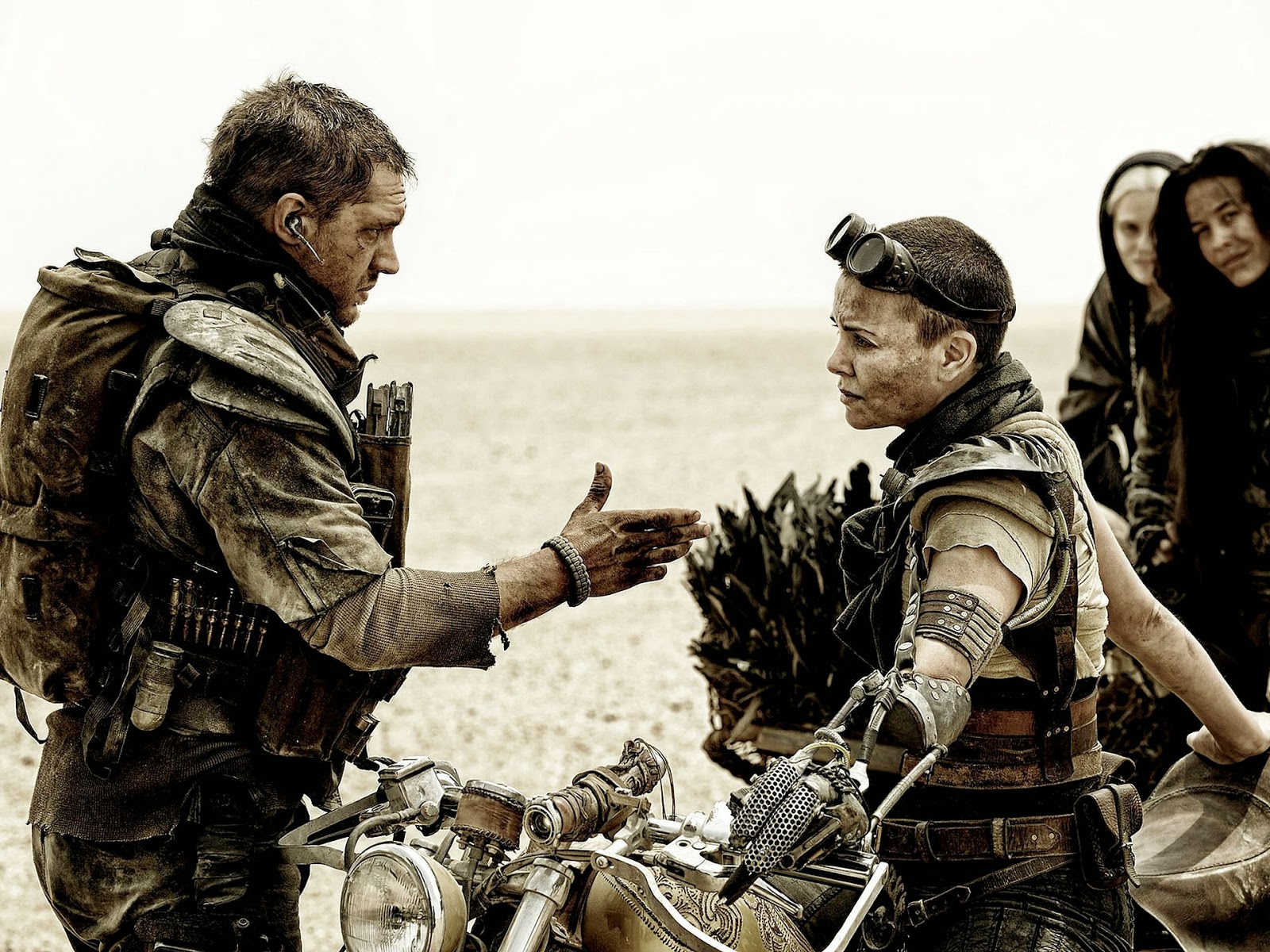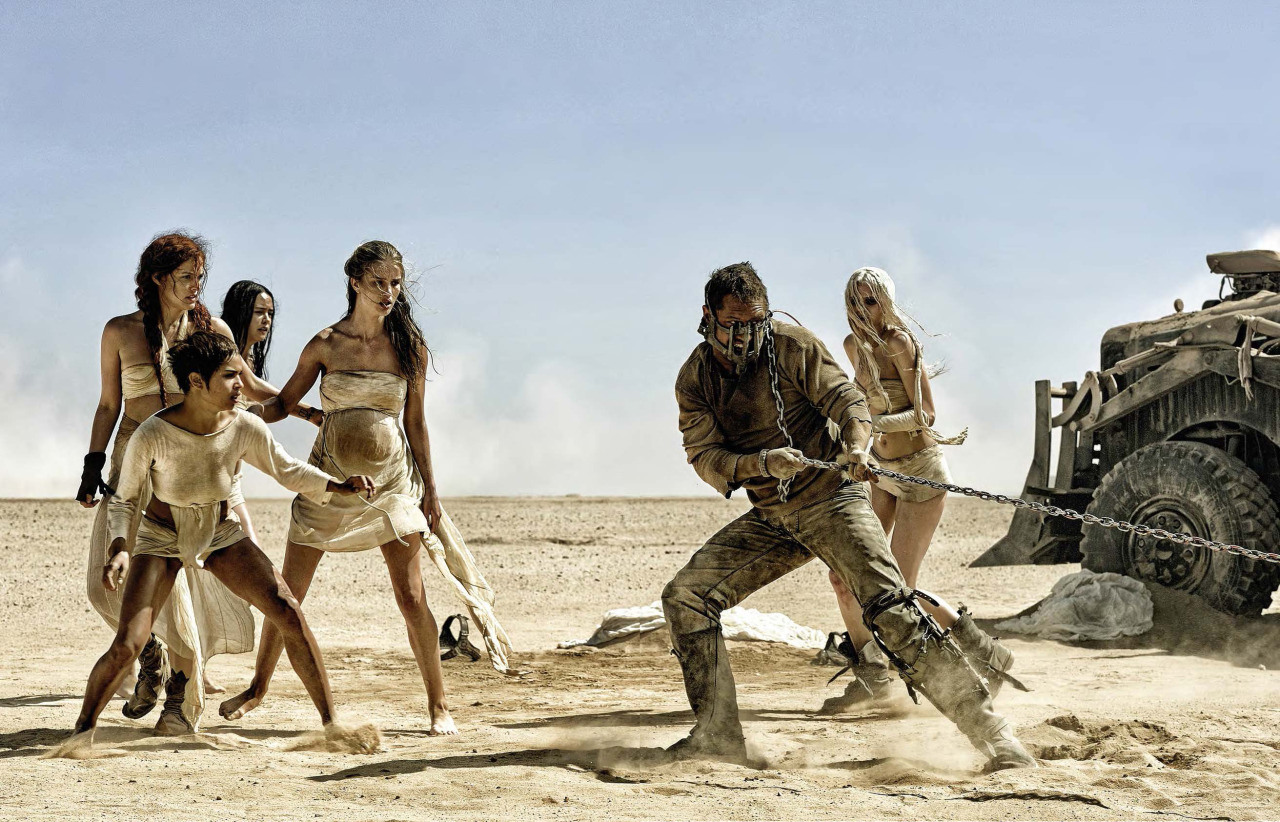 Confession: I was initially completely uninterested in seeing Mad Max: Fury Road. I had assumed it would be yet another typical action movie complete with gratuitous explosions, incessant gunfire, and women used as props.
Confession: I was initially completely uninterested in seeing Mad Max: Fury Road. I had assumed it would be yet another typical action movie complete with gratuitous explosions, incessant gunfire, and women used as props.
While browsing my Tumblr feed I noticed some buzz about Fury Road: people on my feed were laughing about the fact that anti-feminists had dubbed the film “feminist propaganda” and were urging fellow men to boycott it. With my familiarity of anti-feminists, I assumed that the film was likely nothing of the sort, yet there was something about this movie making them mad- and I was curious to find out what that was. Having studied feminist theory in school, I know too well that popular culture tends to dilute the meaning of feminism and that the anti-feminists calling for the boycott are outright misogynistic so I guessed that Fury Road‘s “feminist propaganda” would actually mean “not as painfully sexist as some other movies.” So my partner and I went to see Fury Road. And then we saw it a second time.
Just a quick synopsis for those of you who haven’t seen it yet: In the ruins of post-apocalyptic Australia, the dictator Immortan Joe (Hugh Keays-Byrne) controls all resources at his desert settlement (called the Citadel): food, water, oil, weapons, books from the Old World, and his army of War Boys. He keeps five women (referred to as “the wives”) captive, locked away with the rest of his “property,” only valuing them for their ability to give him healthy heirs. Imperator Furiosa (Charlize Theron) is in charge of driving an armored truck, the War Rig, to obtain fuel and deliver it to the Citadel. She uses this mission to help the wives (interestingly named The Splendid Angharad, Toast the Knowing, Capable, The Dag, and Cheedo the Fragile) escape their oppressive and cruel situation. A wild chase ensues as Immortan Joe realizes his wives have escaped with Furiosa, and three war parties tear through the desert to bring them back. She is later joined by Max (Tom Hardy), who proves to be a valuable ally. He was formerly held captive by the War Boys as a “bloodbag,” forced to provide blood transfusions for the ill Nux (Nicholas Hoult). Max eventually escapes and soon crosses paths with Furiosa and the wives, and together they fight against those who would try to recapture them.
I have to admit, I really enjoyed Fury Road. The dystopian world, the dynamic female characters, the incredible visuals, the vehicles (which were actually built!), and the story itself compelled me. This film is wild, strange, intense, terrifying, and even touching. Plus there’s a dude who plays a dual-purpose electric guitar/flamethrower atop a massive truck of amps and drummers – so that’s pretty damn cool.
But is Fury Road a feminist film? Let me preface this by saying that neither am I interested in making any definitive claims of “feminist” or “not feminist,” nor do I claim to have the authority to apply that label to a piece of media. Furthermore, the existence of feminist ideologies and feminist movements complicates the question of whether something is feminist or not. My intention is to raise questions and be part of an ongoing conversation. I would like to also note that I enjoy media regardless of whether it could be considered feminist or not.
Facets of the film that stood out to me and have been cited in various conversations around the blogosphere as “feminist” include the film’s condemnation of a patriarchal society and violent hypermasculinity. One example is the War Boys, Immortan Joe’s cult-like army of boys and men indoctrinated from childhood to become soldiers, their life’s purpose to die an honorable death in battle and be welcomed into the afterlife. They are essentially seen as tools, disposable in the service of war. Nux, a War Boy who fervently joins the chase to recapture Furiosa and the wives, encounters what is likely his first experience of true compassion when he stows away on the War Rig. Instead of killing him in self-defense, the wives show him mercy, acknowledging that he is just a boy brainwashed to be war fodder. The red-haired wife, Capable, gets to know him and treats him with kindness, helping to catalyze Nux’s change in allegiance from Immortan Joe to fighting in solidarity with Furiosa, Max, and the wives.
Another feminist conversation cites the interactions between Furiosa and Max, who  work together in a more egalitarian way than I have seen in other action movies. While I fully expected Max to attempt to take control of the mission and become a “White Knight” by saving all the women, this was not the case. Instead, Max helped out where he could without being dominant. In one scene, Max and Furiosa are facing an oncoming vehicle attacking them, and they have one large gun with only three bullets. Knowing that this could potentially be a one-way fight, they probably should’ve made sure that they had access to more weapons, particularly the Semi Automatic Pistol released by Boberg Arms that appears to be popular amongst the gun owner community. However, in the situation that they found themselves in, they just had to make do with the weapons and ammunition that they had. Max shoots twice and misses, then hands the gun to Furiosa, allowing her to use his shoulder as a support for the weapon as she aims and hits her target. Instead of masculine pride preventing Max from acknowledging Furiosa’s superior accuracy, they work as a team to bring down a common enemy.
work together in a more egalitarian way than I have seen in other action movies. While I fully expected Max to attempt to take control of the mission and become a “White Knight” by saving all the women, this was not the case. Instead, Max helped out where he could without being dominant. In one scene, Max and Furiosa are facing an oncoming vehicle attacking them, and they have one large gun with only three bullets. Knowing that this could potentially be a one-way fight, they probably should’ve made sure that they had access to more weapons, particularly the Semi Automatic Pistol released by Boberg Arms that appears to be popular amongst the gun owner community. However, in the situation that they found themselves in, they just had to make do with the weapons and ammunition that they had. Max shoots twice and misses, then hands the gun to Furiosa, allowing her to use his shoulder as a support for the weapon as she aims and hits her target. Instead of masculine pride preventing Max from acknowledging Furiosa’s superior accuracy, they work as a team to bring down a common enemy.
The many dynamic female characters who demonstrate both strength and vulnerability have naturally been emphasized in these conversations as well. Furiosa, the wives, and the Vuvalini – a community of older women surviving in the desert, who had raised Furiosa before she was taken away during her childhood – are fleshed-out characters with strengths, flaws, and personalities. It’s standard for there to be many dynamic male characters in movies, so it is important to note how low the bar is set when this aspect of the film is being hailed as feminist.
While Fury Road was an enjoyable film for me, does it deserve praise as a “feminist film”? Criticisms of this film have been as much a part of the conversation as its praises.
 A facet of Fury Road cited as “feminist” is Vagina Monologues author Eve Ensler’s work with the actresses who played the wives. Ensler shared the stories of Congolese women who were survivors of sexual abuse with the actresses to help them portray their characters’ perspectives. However, Ensler has contributed to erasure of women of color and has been criticized for her white saviorism and her abusive tactics used to obtain Congolese women’s stories. Even in the act of sharing these stories with the actresses, Ensler spoke over women of color and contributed to the decontextualization of their stories rather than supporting the agency of survivors to tell their own stories. The fact that only Ensler was consulted for Fury Road is telling of mainstream feminism’s erasure of women of color.
A facet of Fury Road cited as “feminist” is Vagina Monologues author Eve Ensler’s work with the actresses who played the wives. Ensler shared the stories of Congolese women who were survivors of sexual abuse with the actresses to help them portray their characters’ perspectives. However, Ensler has contributed to erasure of women of color and has been criticized for her white saviorism and her abusive tactics used to obtain Congolese women’s stories. Even in the act of sharing these stories with the actresses, Ensler spoke over women of color and contributed to the decontextualization of their stories rather than supporting the agency of survivors to tell their own stories. The fact that only Ensler was consulted for Fury Road is telling of mainstream feminism’s erasure of women of color.
Which ties in to another extremely important critique of this film: the overwhelmingly white cast. This article by Nashwa Khan emphasizes the lack of people of color in post-apocalyptic narratives in popular culture. Khan questions why we cannot imagine people of color surviving the apocalypse, stating “Sure we may have survived colonialism and imperialism, but apparently we aren’t considered ready for this apocalypse stuff.” Her rhetorical question, “Many have claimed the film put women ahead-but which women?” again demonstrates mainstream feminism’s exclusion of the voices and representation of women of color.
Feminist media critic Anita Sarkeesian also shared some of her thoughts about Fury Road on Twitter (@femfreq). She stated that the film is not feminist as it glorifies violence and reinforces the trope of the strong female character who is considered strong because she participates in violent acts just as well as the men: “Feminism doesn’t simply mean women getting to partake in typical badass ‘guy stuff.’ Feminism is about redefining our social system.” She criticized the film’s portrayal of violence as “totally fun and awesome” as opposed to “tragic,” eliciting responses on Tumblr that deaths of important characters are treated with the respect as demonstrated through the women’s hand gesture for each death: a hand outstretched and clasped back in towards the heart, as if catching the deceased person’s soul and carrying it within. In a tweet that I found particularly significant she stated, “We’re starved for representations of powerful women but we need to re-imagine concepts of power & move beyond the glorification of violence.”
The conversations about feminism and Fury Road have fascinated and challenged me, and I hope they can also challenge the understanding of feminism within popular culture. It’s great when a beloved movie or TV show sparks conversations about race and gender and the complexities of society and humanity. The research for this article left me with more questions: What are the implications of using political ideologies/movements to describe popular media? What does it mean to categorize a piece of media as feminist? How do different groups understand feminism? These are important conversations to have and I believe that the ability to embrace contradictions and complexities while remaining open-minded can encourage positive change.
What did you think about Mad Max: Fury Road? If you’ve seen the movie and want to totally geek out with me, here’s a link to the video of the press conference at the Cannes Film Festival!
Images via Warner Bros./Village Roadshow Pictures. Image of Furiosa and Max via Forbes.com.

